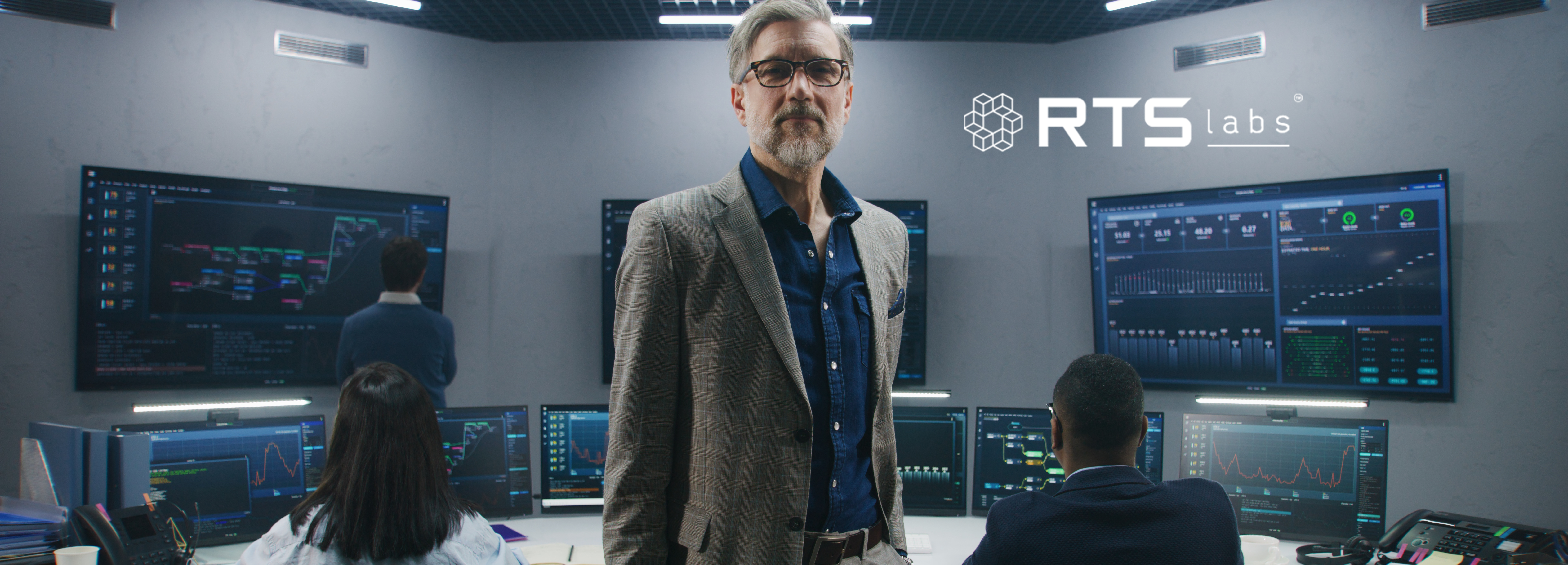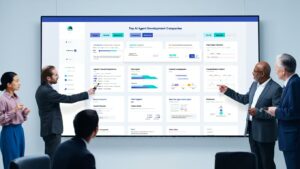- Discover the benefits and drawbacks of AI consulting vs. in-house development
- Learn key factors to consider when deciding between AI consulting and in-house teams
- Explore a hybrid approach that combines the best of both worlds for your AI initiatives
Artificial Intelligence (AI) is rapidly transforming industries, offering unprecedented opportunities for growth and efficiency. As businesses seek to harness the power of AI, a pivotal decision arises: should they partner with an AI consulting firm or build an in-house AI development team? This comprehensive guide explores the nuances of both approaches, helping organizations make informed choices aligned with their unique needs and objectives.
Understanding the AI Field
Before delving into the specifics of consulting versus in-house development, it’s crucial to grasp the breadth of AI applications. AI encompasses a wide array of technologies, including machine learning, natural language processing, computer vision, and robotics. These technologies can be leveraged to automate tasks, gain insights from data, personalize customer experiences, optimize operations, and drive innovation across various business functions.
For example, in the retail industry, AI can be used for demand forecasting, inventory management, and personalized product recommendations. In healthcare, AI is being used for medical imaging analysis, drug discovery, and patient risk assessment. In manufacturing, AI is streamlining production processes, predicting maintenance needs, and improving quality control. The possibilities are virtually endless, and businesses across all sectors are exploring ways to integrate AI into their operations.
The Case for AI Consulting
AI consulting firms specialize in providing expertise and guidance to businesses seeking to adopt AI solutions. They offer a range of services, including:
- Strategic Assessment: Consultants analyze a company’s business processes, identify potential AI use cases, and develop a tailored AI strategy. This involves a thorough understanding of the company’s goals, challenges, and data infrastructure. Consultants can help businesses prioritize AI initiatives based on their potential impact and feasibility.
- Technology Selection: Consultants assist in selecting the most suitable AI tools and platforms based on specific needs and budget constraints. With the vast array of AI technologies available, choosing the right tools can be daunting. Consultants can help businesses navigate the options and select solutions that align with their specific requirements and technical capabilities.
- Implementation and Integration: Consultants oversee the implementation of AI solutions, ensuring seamless integration with existing systems and workflows. This involves configuring AI models, developing custom applications, and integrating AI into existing data pipelines. Consultants can also help businesses overcome technical challenges and ensure that AI solutions are scalable and adaptable to future needs.
- Training and Support: Consultants provide training to employees on how to use AI tools effectively and offer ongoing support to address any challenges. This is crucial for ensuring that employees are comfortable using AI tools and understand how to interpret and act on AI-generated insights. Ongoing support ensures that AI solutions continue to deliver value over time.
Key Advantages of AI Consulting:
- Access to Expertise: Consultants bring specialized knowledge and experience in AI, allowing businesses to leverage cutting-edge technologies without building internal expertise from scratch. This can be particularly beneficial for businesses that lack in-house AI expertise or are new to AI adoption. Consultants can bring a wealth of knowledge and best practices from working with various clients across different industries.
- Cost-Efficiency: Consulting can be more cost-effective than building an in-house team, especially for short-term or specialized projects. Hiring and retaining top AI talent can be expensive, and building an in-house team may not be financially viable for all businesses. Consulting allows businesses to access AI expertise on a project basis, without the long-term overhead costs associated with building and maintaining an internal team.
- Reduced Time to Market: Consultants can accelerate AI implementation, helping businesses realize value sooner. With their experience and established processes, consultants can streamline the implementation process, helping businesses avoid costly delays and achieve faster time-to-value.
- Objective Perspective: Consultants offer unbiased insights and recommendations, free from internal biases or limitations. They can provide a fresh perspective on business challenges and opportunities, helping businesses identify innovative solutions that they may not have considered on their own.
The Case for In-House AI Development
Building an in-house AI development team involves hiring and nurturing AI talent within the organization. This approach offers several advantages:
- Greater Control: In-house teams have more control over the development process, allowing for greater customization and alignment with specific business needs. They can tailor AI solutions to the organization’s unique processes and workflows, ensuring a better fit and greater value.
- Intellectual Property Ownership: In-house development ensures that the organization retains ownership of the AI solutions and the underlying intellectual property. This can be a significant advantage, especially for businesses that develop proprietary AI algorithms or models that can be leveraged for competitive advantage.
- Long-Term Investment: Building an in-house team can be a strategic long-term investment, fostering innovation and building internal AI capabilities. By nurturing AI talent within the organization, businesses can create a sustainable source of innovation and expertise, enabling them to stay ahead of the curve in the rapidly evolving AI domain.
- Deep Integration: In-house teams can seamlessly integrate AI solutions into existing systems and processes, leveraging their deep understanding of the organization’s infrastructure. This can lead to more efficient and effective AI implementations, as in-house teams have a better grasp of the organization’s data infrastructure, technical architecture, and business processes.
Key Factors to Consider
The decision to choose AI consulting or in-house development hinges on several key factors:
- Project Scope and Complexity: Complex or long-term projects that require ongoing development and maintenance may necessitate an in-house team. In contrast, simpler or time-sensitive projects with well-defined goals may be better suited for consulting. For example, a project to develop a sophisticated AI-powered recommendation engine might require a dedicated in-house team, while a project to implement an off-the-shelf chatbot for customer service might be better handled by a consultant.
- Budget Constraints: Consulting can be a more cost-effective option for smaller budgets, while building an in-house team requires significant investment in talent acquisition and infrastructure. Salaries for AI experts are often high, and businesses need to factor in additional costs for recruiting, training, and providing the necessary hardware and software.
- Urgency: If time-to-market is critical, consulting can often provide faster results compared to building an in-house team from scratch. Consultants can hit the ground running, leveraging their existing expertise and experience to quickly deliver AI solutions. In contrast, building an in-house team can take time, as it involves recruiting, onboarding, and training new employees.
- Internal Resources and Expertise: If the organization already has some AI expertise, it may be easier to expand and build an in-house team. This can be a more cost-effective and efficient approach than starting from scratch. However, if the organization lacks AI expertise, consulting can provide a valuable bridge to help build internal capabilities over time.
- Data Sensitivity: If data privacy and security are paramount, an in-house team may be preferable as it allows for greater control over data access and management. This is particularly important for industries with strict data regulations, like healthcare and finance. In-house teams can ensure that sensitive data is handled in compliance with relevant regulations and that security measures are in place to protect against breaches.
Making the Right Choice: A Hybrid Approach
In many cases, a hybrid approach that combines consulting and in-house development can offer the best of both worlds. Organizations can leverage consultants for initial strategic planning, technology selection, and implementation, while simultaneously building an internal team to take over long-term maintenance, customization, and further development.
This hybrid model allows businesses to tap into specialized expertise while gradually developing internal capabilities. It also provides flexibility, allowing organizations to scale their AI efforts as needed. For example, a company might engage a consultant to develop a proof-of-concept AI solution, and then use the learnings from this project to build an in-house team to further develop and scale the solution.
The Path Forward: A Strategic Partnership
Whether an organization chooses consulting, in-house development, or a hybrid approach, the key to success lies in building a strong partnership between business and AI experts. This partnership should be based on clear communication, shared goals, and a mutual understanding of the challenges and opportunities that AI presents.
By working together, businesses and AI experts can create AI solutions that drive real business value, enhance customer experiences, and propel the organization toward a more innovative and successful future. This collaboration requires a deep understanding of both the business context and the technical capabilities of AI. Businesses need to clearly articulate their goals and challenges, while AI experts need to translate these into actionable AI solutions.
Takeaway: The choice between AI consulting and in-house development is not a one-size-fits-all decision. It depends on various factors, including the project scope, budget, urgency, internal resources, and data sensitivity. By carefully weighing these factors and considering the pros and cons of each approach, businesses can make informed decisions that align with their strategic objectives and pave the way for a successful AI journey. Remember, the ultimate goal is to leverage AI to create value, drive innovation, and stay ahead of the competition in today’s rapidly changing business environment.
FAQs: AI Consulting vs. In-House Development
Q: What are the key differences between AI consulting and in-house AI development?
A: AI consulting involves partnering with outside experts specializing in AI implementation. In-house development means building and maintaining an internal team of AI professionals. Consulting offers quick access to expertise, cost-efficiency for short-term projects, and an objective perspective. In-house development provides greater control, intellectual property ownership and deeper integration with existing systems.
Q: Which option is more cost-effective: AI consulting or in-house development?
A: The cost-effectiveness depends on your specific needs and circumstances. Consulting is generally more affordable for short-term projects or when you lack internal AI expertise. However, building an in-house team can be a more cost-effective long-term investment if you have ongoing AI needs.
Q: How do I choose the right AI consulting firm?
A: Consider factors like the firm’s experience, expertise in your industry, track record, pricing model, and cultural fit. Request proposals from multiple firms, check references, and interview potential consultants to find the best fit for your organization.
Q: When should I consider building an in-house AI development team?
A: Consider building an in-house team if you have long-term AI needs, require deep integration of AI into your systems, prioritize control over the development process, and want to retain ownership of the intellectual property.
Q: What are the benefits of a hybrid approach that combines consulting and in-house development?
A: A hybrid approach allows you to leverage external expertise for initial stages, such as strategic planning and implementation, while gradually building internal capabilities for long-term maintenance and customization. This can be a flexible and cost-effective way to kickstart your AI initiatives.
Q: How can I ensure the success of my AI initiatives, whether I choose consulting or in-house development?
A: Key factors for success include:
- Clearly define your AI goals and objectives.
- Ensure alignment between your AI strategy and overall business goals.
- Invest in data quality and infrastructure.
- Foster a culture of collaboration between business and AI experts.
- Monitor and evaluate the performance of AI solutions.
Q: What are some common challenges businesses face when implementing AI, and how can they be addressed?
A: Common challenges include:
- Lack of AI expertise: Address this by hiring consultants or investing in training for existing staff.
- Data quality issues: Invest in data cleansing and management processes.
- Integration challenges: Ensure compatibility between AI solutions and existing systems.
- Ethical concerns: Establish ethical guidelines for AI use and ensure transparency in decision-making processes.
- Resistance to change: Communicate the benefits of AI and involve employees in the implementation process.









